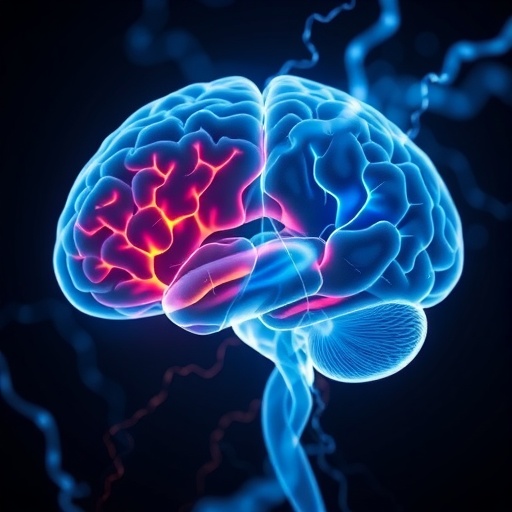In a groundbreaking study, researchers have revealed promising findings regarding the neuroprotective effects of a combination therapy involving melatonin and URB447 in the aftermath of neonatal hypoxia-ischemia. This condition, characterized by the insufficient supply of oxygen to the brain during critical developmental periods, poses significant risks of long-term neurological damage. The research, conducted by Chillida, Alvarez, and de la Parte, alongside their team, sheds light on a potential therapeutic strategy to mitigate such injuries, thus giving hope to countless families affected by this devastating complication.
Neonatal hypoxia-ischemia remains a major contributor to morbidity and mortality in newborns. The injury can lead to various neurological deficits, including cerebral palsy, cognitive impairments, and behavioral disorders. Traditional therapies have had limited success in preventing or repairing the damage that occurs during these critical incidents. Therefore, identifying effective neuroprotective agents is paramount. The combination therapy discussed in this study presents an innovative approach targeting the multifaceted nature of brain injuries caused by hypoxia-ischemia.
The role of melatonin as a neuroprotective agent has garnered increasing attention in recent years. Known primarily for regulating circadian rhythms, melatonin possesses antioxidant properties that can reduce oxidative stress, a significant contributor to neuronal cell death. Its ability to modulate inflammation and promote cell survival pathways further strengthens its candidacy as a treatment for conditions characterized by brain injury. This study builds on previous research indicating the substance’s therapeutic potential and explores it in tandem with URB447—a compound known for its neuroprotective characteristics.
URB447, a selective cannabinoid receptor agonist, has shown promise in several preclinical studies aimed at treating neurological disorders. The synergy between cannabinoids and melatonin could enhance the protective effects against hypoxic-ischemic injury. By targeting different pathways involved in neuroprotection, the combination therapy aims to create a multi-pronged defense against the cascade of detrimental processes triggered by oxygen deprivation in the brain.
In their experimental design, the research team employed animal models to simulate the effects of neonatal hypoxia-ischemia. They administered both melatonin and URB447 surrounding the induced brain injury to assess their effects on neurobehavioral outcomes and histopathological analyses. The methodology was rigorous, ensuring that the findings were credible and could lead to effective clinical applications. This comprehensive approach exemplifies the need for multi-faceted strategies in addressing complex neurological injuries.
Results from the study indicated a significant improvement in neurobehavioral outcomes in subjects treated with the combination therapy compared to control groups. Notable improvements in motor function and cognitive assessments suggested a protective influence resulting from the administration of melatonin and URB447. Furthermore, histological examinations revealed reduced neuronal damage and apoptosis, confirming the protective effects observed in vivo.
Understanding the underlying mechanisms is critical for future therapeutic applications. The research team meticulously explored the biochemical pathways impacted by the combination therapy. Melatonin’s antioxidative properties, combined with URB447’s anti-inflammatory effects, appeared to cooperate in reducing oxidative stress and minimizing neuroinflammation. Such findings underscore the importance of a targeted approach in developing effective treatments for neonatal brain injuries.
As the researchers delve deeper into the biochemical interactions of melatonin and URB447, they raise intriguing questions about the optimal dosages and timing of administration. These variables can significantly influence the efficacy of treatments in clinically relevant scenarios. Moreover, the findings highlight the necessity of further studies to evaluate the long-term effects of such therapies and their translation into human medicine.
Besides therapeutic implications, the study invites broader discussions regarding the importance of developing interdisciplinary collaborations in research. By intertwining insights from neurobiology, pharmacology, and clinical practice, the investigation reveals how collective efforts can drive innovation in treatment development. It also emphasizes the need for increased funding and support for research endeavors targeting neonatal brain injury, an area often overlooked amid more prevalent diseases.
As promising as these findings are, the road to clinical application is fraught with challenges. Regulatory hurdles, potential side effects, and individual variability in response to treatment will require thorough examination. Therefore, ongoing clinical trials and further preclinical studies are essential to validate these findings and refine treatment protocols. This step is crucial in moving from bench to bedside and ensuring that vulnerable newborns benefit from these advancements.
The implications of this research extend beyond simply treating hypoxia-ischemia. It invites the possibility of utilizing combination therapies as a broader strategy for various neurological conditions. As researchers strive for more effective treatments for neurological disorders, the potential of pairing existing medications with novel compounds remains a rich avenue for exploration.
In conclusion, the insights gained from this study illuminate a path toward innovative and effective treatments for neonatal hypoxia-ischemia, harnessing the neuroprotective powers of melatonin and URB447. As researchers continue to unearth the complexities of these compounds and their interactions, the hope is that future generations will have access to therapies that can safeguard cognitive development and enhance quality of life for those impacted by early life brain injuries. The potential for a brighter future in neuroprotection is on the horizon as we stand on the cusp of a new era in neonatal care.
This study serves as a testament to the persistent quest for knowledge and the relentless pursuit of solutions to one of the most challenging aspects of pediatric medicine. As we await further developments from this research, the foundation has been laid for future breakthroughs that could ultimately change the landscape of neonatal health interventions.
Subject of Research: Neuroprotective effects of combination therapy in neonatal hypoxia-ischemia.
Article Title: Neuroprotective effect of the combination therapy of melatonin and URB447 after neonatal hypoxia-ischemia.
Article References:
Chillida, M., Alvarez, F.J., de la Parte, B.H. et al. Neuroprotective effect of the combination therapy of melatonin and URB447 after neonatal hypoxia-ischemia.
BMC Complement Med Ther 25, 274 (2025). https://doi.org/10.1186/s12906-025-05021-7
Image Credits: AI Generated
DOI: 10.1186/s12906-025-05021-7
Keywords: Neuroprotection, neonatal hypoxia-ischemia, melatonin, URB447, combination therapy.
Tags: antioxidant properties of melatonincognitive impairments in newbornsdual therapy for brain injuryhypoxia-ischemia treatment strategiesinflammation modulation in neuroprotectioninnovative therapies for cerebral palsylong-term effects of neonatal brain injurymelatonin neuroprotective effectsneonatal hypoxia-ischemia researchneonatal neurological damage preventionneuroprotective agents for newbornsURB447 neonatal brain injury





